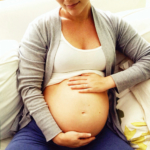While the majority of pregnant women experience nausea and/or vomiting during the first trimester of pregnancy, a smaller subset of women — around 1% — experience more severe and intractable vomiting, or hyperemesis gravidarum (HG). If left untreated, prolonged hyperemesis can lead to weight loss, dehydration, nutrient deficiencies and electrolyte disturbances. Hyperemesis may also increase risk for anxiety or depression during pregnancy.
We have few options for the effective treatment for hyperemesis gravidarum. Ondansetron (Zofran) is commonly used in this setting, and a pilot study indicated that the antidepressant mirtazapine (Remeron) may also be helpful for the treatment of HG. According to a small study presented at this year’s American College of Obstetrics and Gynecology Annual Clinical and Scientific Meeting, gabapentin may be another option for the treatment of hyperemesis gravidarum.
This study recruited pregnant women with hyperemesis gravidarum who had vailed to respond to previous treatments were randomized to receive gabapentin (1,800 to 2,400 mg per day) or an active comparator, either ondansetron or metoclopramide, for 7 days. All medications were administered orally. Symptoms were assessed using the Motherisk pregnancy-unique quantification of nausea and emesis (PUQE) questionnaire.
A total of 31 women were randomized to treatment; 21 participants (12 gabapentin and 9 controls) provided analyzable data. The researchers observed that women in the gabapentin group had greater reductions in PUQE scores and greater increases in oral nutrition compared to women receiving the active comparator. In addition, women in the gabapentin groups had higher global satisfaction with and relief from the treatment, and thus were more likely to request continuation of treatment with gabapentin.
This is obviously a small study and will require replication in a larger randomized trial; however, the data is promising. One of the significant challenges in treating hyperemesis is that treatment is typically delivered during the first trimester, and thus, with any intervention, there are concerns regarding risk of congenital malformations. Data regarding the use of gabapentin during pregnancy has grown considerably, with a recent study including over 4000 first trimester exposures indicating no evidence of an association between gabapentin exposure during early pregnancy and overall risk of major malformations.
Ruta Nonacs, MD PhD
Small study finds gabapentin effectively treats hyperemesis gravidarum (Healio)
e.








Leave A Comment